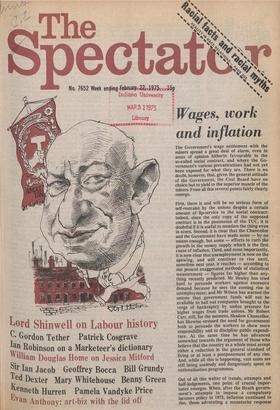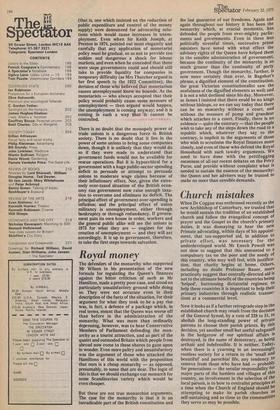1 Wages, work
and inflation
The Government's wage settlement with the miners spread a great deal of alarm, even in areas of opinion hitherto favourable to the so-called social contract, and where the Government's various prevarications had not yet been exposed for what they are. There is no doubt, however, that, given the general attitude of the Government, the Coal Board have no choice but to yield to the superior muscle of the miners. From all this several points fairly clearly emerge.
First, there is and will be no serious form of self-restraint by the unions despite a certain amount of lip-service to the social contract: indeed, since the only copy of the supposed contract is in the possession of the TUC, it is doubtful if it is useful to mention the thing even in scorn. Second, it is clear that the Chancellor and the Government have made some — by no means enough, but some — efforts to curb the growth in the money supply which is the first cause of inflation. Third, and most importantly, it is now clear that unemployment is now on the upswing, and will continue to rise until, sometime next year, it reaches — according to our present exaggerated methods of statistical measurement — figures far higher than anything recently predicted. Mr Healey has tried hard to persuade workers against excessive demand because he sees the coming rise in unemployment; and Mr Wilson has warned the unions that government funds will not be available to bail out companies brought to the verge of bankruptcy by undue pressure for higher wages from trade unions. Mr Robert Carr, still, for the moment, Shadow Chancellor, has likewise stressed the need for government both to persuade the workers to show more responsibility and to discipline public expenditure. At the same time he has advanced somewhat towards the argument of those who believe that the country as a whole must accept either a reduction in the general standard of living or at least a postponement of any rise. And, while all this is happening, vast sums are still being uselessly and dangerously spent on nationalisation programmes.
Out of all this welter of trends, attempts and half-judgements, one point of crucial importance emerges. When, after the Heath government's attempts to impose a compulsory incomes policy in 1972, inflation continued to rise, those, advocating a monetarist response (that is, one which insisted on the reduction of public expenditure and control of the money supply) were denounced for advocating solutions which would cause increases in unemployment. Even when Sir Keith Joseph, at Preston in 1974, pointed out most elegantly and carefully that any application of monetarist policy must be gradual, so as not to provide too sudden and dangerous a shock for labour markets, and even when he conceded that there were steps governments could and should still take to provide liquidity for companies in temporary difficulty (as Mrs Thatcher argued in her first speech to the 1922 Committee), the derision of those who believed that monetarism causes unemployment knew no bounds. As the monetarists — who always accepted that their policy would probably cause some measure of unemployment — then argued would happen, the unemployment is coming anyway; and it is coming in such a way that it cannot be controlled.
There is no doubt that the monopoly power of trade unions is a dangerous force in British society. There is no doubt that it lies in the power of some unions to bring some companies down, though it is unlikely that they would do so if they were made to understand that government funds would not be available for rescue operations. But it is hypocritical for a government with a huge public-sector spending deficit to persuade or attempt to persuade unions to moderate wage claims because of their inflationary effect. Nor, given the extremely over-taxed situation of the British economy can government now raise enough taxation to overcome and eliminate its deficit. The principal effect of government over-spending is inflation; and the principal effect of union militancy is unemployment, either through bankruptcy or through redundancy. If government puts its own house in order, workers and the general public alike will see the unions in 1975 for what they are — engines for the creation of unemployment — and they will act accordingly. It is up to government, therefore, to take the first steps towards salvation.
Royal money The defenders of the monarchy who supported Mr Wilson in his presentation of the new formula for regulating the Queen's finances against the bitter criticism of such as Mr Hamilton, made a pretty poor case, and stood on particularly unsatisfactory ground while doing so. They were not accurate even in their description of the facts of the situation, for their argument for what they took to be a pay rise was, in fact, a defence of a package which, in real terms, meant that the Queen was worse off than before in the administration of the monarchy. What was more than ordinarily depressing, however, was to hear Conservative Members of Parliament defending the monarchy as a tourist attraction, and as part of the quaint and outmoded Britain which people from abroad now come to these shores to gaze upon in wonder. Even more paltry and unsatisfactory was the argument of those who attacked the Hamiltons of this world with the proposition that ours is a cheap monarchy — as opposed, presumably, to some that are dear. The logic of this is that we should exchange our monarch for some Scandinavian variety which would be even cheaper.
But these are not true monarchist arguments. The case for the monarchy is that it is an ineradicable part of the British constitution and the last guarantor of our freedoms. Again and again throughout our history it has been the monarchy which, at crucial moments, has defended the people from over-mighty parliaments and governments. Even in these less politically stressful times, successive prime ministers have noted with what effect the advisory rights of the Queen have helped them in the sensible administration of government, because the continuity of the monarchy is so much greater than the continuity of party government. Though the monarchy, further, is now more certainly than ever, in Bagehot's phrase, a dignified element of the constitution, the great Victorian constitutionalist saw the usefulness of the dignified elements as well; and it is not a whit declined since his day. Moreover, as James I insisted that there could be no kings without bishops, so we can say today that there can be no monarchy without a court, and without the measure of pomp and grandeur which attaches to a court. Finally, there is no evidence — quite the contrary — that the people wish to take any of the steps down the road to a republic which, whatever they say to the contrary, is implicit in the arguments of those who wish to scrutinise the Royal finances more closely, and even of those who defend the Royal Household with such tawdry arguments. We need to have done with the pettifogging meanness of all our recent debates on the Privy Purse, and provide without complaint what Is needed to sustain the essence of the monarchy: the Queen and her advisers may be trusted to make no more than sensible demands.
Church mistakes
When Dr Coggan was enthroned recently as the new Archbishop of Canterbury, we trusted that he would sustain the tradition of an established church and follow the evangelical concept of prayer and the Gospel as the church's primary duties. It was dismaying to hear the new Primate advocating, within days of his appointment, that tax-supported aid, in addition to private effort, was necessary for the underdeveloped world. Mr Enoch Powell was not slow to suggest that this amounted to a compulsory tax on the poor and the needy of this country, who may well feel, with justification, that charity begins at home. Others, including no doubt Professor Bauer, more practically suggest that centrally-directed aid is not to the ultimate benefit of the countries being 'helped', buttressing dictatorial regimes; co help these countries it is important to help their primary industries through realistic transactions at a commercial level.
Now it looks as if a further retrograde step in the established church may result from the decision of the General Synod, by a vote of 228 to 51, to abolish the long-standing power of private patrons to choose their parish priests. By this decision, yet another small but useful safeguard in the hedgerow of our spiritual affairs Is destroyed, in the name of democracy, as being archaic and indefensible. It is neither. Today, when there is a yearning in an increasinglY rootless society for a return to the 'small and beautiful' and parochial life, any tendency t° remove from those who have had — probablY for generations — the secular responsibility fo.r major parts of the hamlets and villages of this country, an involvement in the selection of the local parson, is to bow to centralist principles at a time when the Church of England should be attempting to make its parish churches as self-sustaining and as close to the communities they serve as may be possible.



































 Previous page
Previous page